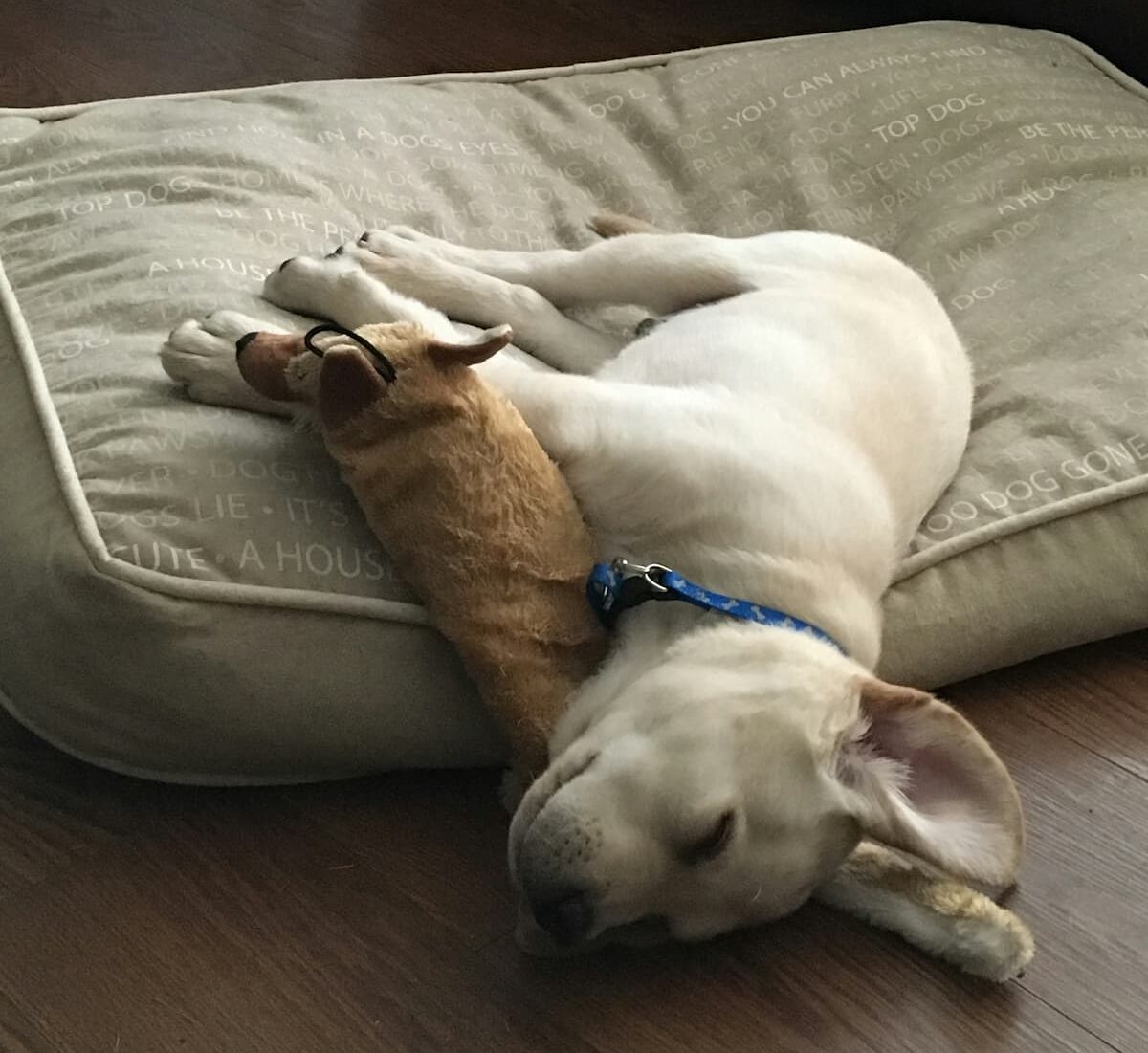Have you ever wondered why dogs have this peculiar habit of digging at their beds before settling down for a snooze?
It’s a sight we’ve all witnessed, yet it never fails to amuse and intrigue us.
Picture this – your furry friend circles around, pawing at the ground as if it were hiding some hidden treasure, before finally flopping down on their cozy spot.
But what is the reason behind this mysterious canine behavior?
Read on to find out.
Instinctual Roots of Bed Digging in Dogs
Have you ever wondered why your beloved canine companion digs at their bed before lying down? It may seem like a quirky habit, but this behavior actually stems from deep instinctual roots.
Dogs, descendants of wild canines, have inherited a number of behaviors from their ancestors, and bed digging is one of them.
Here are the fascinating reasons behind this instinctual behavior:
Creating a Comfortable Sleeping Spot: One of the main reasons dogs dig at their beds is to make it more comfortable.
In the wild, dogs would dig shallow nests in the ground to create a cozy spot to rest.
By scratching and pawing at their beds, dogs are essentially trying to create a similar comfortable environment for themselves.
They may be trying to fluff up the bedding or create a depression where they can curl up, mimicking the sensation of being in a protective den.
Seeking Comfort and Familiarity: Just like how humans fluff their pillows or rearrange their blankets to find the perfect sleeping position, dogs may be attempting to create a more comfortable area for themselves.
By digging and scratching at their beds, they might be trying to adjust the texture, shape, or temperature of the surface to their liking, ensuring a restful sleep.
Marking Territory: Dogs have a keen sense of smell, and they use it to mark their territory.
Dogs have scent glands in their paws, and by scratching at the bed, they are leaving their unique scent behind.
This is a way for dogs to claim their sleeping area and communicate to other animals that this spot is already taken. It’s their way of saying, “This is my space, don’t encroach!”
Relieving Stress: Bed digging can also be a self-soothing behavior for dogs.
Similar to how humans fidget or pace when feeling anxious, dogs may dig at their beds as a way to cope with stress or release pent-up energy.
By engaging in this instinctual behavior, dogs may find a sense of comfort and relaxation, helping them prepare for a calm and peaceful sleep.
Regulating Temperature: Just like us, dogs find comfort in a cooler sleeping surface during hot weather, and vice versa.
By digging at their bed, they can create a shallow spot where they can lie down and get relief from the heat. Similarly, during colder weather, they may dig to fluff up their bedding, trapping warmer air around them.
It’s their way of adapting to their environment and ensuring their comfort.
Tips to Minimize Bed Digging Behavior without Restricting Natural Instincts
Now that we understand the underlying instincts behind this behavior, you might be wondering how to minimize bed digging without completely restricting your dog’s natural inclinations.
First, it’s essential to provide an appropriate digging outlet, such as a designated digging area in your backyard.
This way, your dog can still satisfy their urge to dig without causing damage to their bed or other indoor furniture.
Secondly, ensure your dog’s bed is sturdy, with materials that can withstand digging and pawing.
Opt for beds that are specifically designed for active diggers, featuring reinforced seams and durable fabrics.
Additionally, consider providing your pup with interactive toys and puzzles to keep their mind engaged and redirect their energy away from bed digging.
Enriching Your Dog’s Environment to Curb Bed Digging Habit
To address your dog’s bed digging habit, it’s essential to provide them with an enriched environment.
Enrichment involves creating a space that stimulates their physical and mental well-being.
By ensuring your pup has plenty of outlets for their natural instincts and curiosity, you can help curb their bed digging behavior.
One way to do this is by providing interactive toys that encourage mental stimulation, such as treat-dispensing puzzles or chew toys.
These toys not only occupy their minds but also provide them with an alternative outlet for their energy.
Another way to enrich your dog’s environment is through regular exercise.
A tired pup is less likely to engage in destructive behaviors, including bed digging.
Make sure to provide daily walks, playtime, or even obedience training sessions to engage your dog physically and mentally.
For certain breeds, more intense activities like agility training or even scent work can provide the mental and physical challenges they need.
By incorporating regular exercise into their routine, you can help reduce their excess energy and redirect it towards positive behaviors.
Remember, every dog is unique, and the reasons behind their bed digging habit may vary.
It’s essential to observe your furry friend’s behavior and experiment with different strategies to find what works best for them.
With patience, consistency, and a well-enriched environment, you can help your dog find more constructive ways to relax and minimize their bed digging antics.
Together, you’ll create a harmonious living space where your pup can thrive.
FAQ
Q: Why do dogs feel the need to dig at their beds before they finally plop down for a cozy snooze?
A: Well, my curious friend, there are a few reasons that might explain this peculiar habit.
First and foremost, it’s important to remember that dogs are descendants of wild canines who lived in the great outdoors.
So, when they had to settle down for the night, they didn’t have the luxury of plush mattresses or feather pillows like we do.
Instead, they had to create their own comfy sleeping spots by using their paws to dig and create a shallow burrow in the earth.
Q: Wait a minute…
are you saying our domesticated dogs are trying to tap into their wild ancestry every time they fluff their beds?
A: Absolutely! Even though our furry companions have been domesticated for centuries, certain instincts are still deeply ingrained in their DNA.
So, when they dig at their beds, it serves as a way to mimic the natural instincts of their ancestors.
It’s like they’re saying, “Hey, I’m creating a cozy den just like my relatives did back in the day!”
Q: That makes sense, but what about those dogs who dig at their beds even if they’re placed on a cozy carpet or a fluffy blanket?
A: Ah, you’ve caught me there! Some dogs, despite having the most luxurious sleeping spots, still feel the urge to dig.
In these cases, it might be a leftover behavior from their puppy days.
You see, when puppies are born, they spend their early weeks snuggled up with their littermates, often in a small, confined area like a den.
Digging at their beds could be a way for adult dogs to recreate that same sense of security and comfort from their formative months.
Q: So, it’s all about finding comfort and security?
A: You got it! Digging provides dogs with a sense of control over their sleeping area, allowing them to reshape it to their liking.
Whether it’s creating a cool spot in the summer or a warmer nook in the winter, their need for comfort and security continues to guide their ancient instincts.
Q: Well, that’s fascinating! Is there anything I can do to discourage or manage this behavior?
A: Of course! If you find that your dog’s digging habit is causing damage to furniture or bedding, you can redirect their digging urge to a more appropriate outlet.
Providing them with a designated spot, like a dig box filled with soft soil or sand, allows them to indulge in their primal instincts without damaging any precious heirlooms.
Closing Remarks
So, next time you see your furry friend frantically scratching, digging, and circling before settling down on their bed, you’ll know exactly why.
Dogs have these innate instincts that have been passed down over generations, reminding them of their wild ancestors.
By digging at their beds, they not only create a comfortable spot to lay but also release any pent-up energy.
It’s their way of saying, “This is where I belong, and I’m ready for a good snooze!”
Remember, our loyal four-legged companions are perfectly in tune with their instincts, no matter how domesticated they may be.
So, embrace their quirky habits and give them the best and coziest beds possible to satisfy their inner canine needs.
Rest assured, they’ll reward you with endless love, loyalty, and the sweetest dreams you could imagine.
Happy snuggling!












